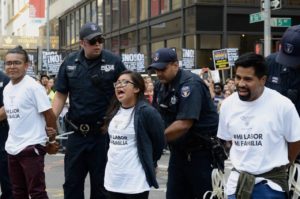By John Burton |
RED BANK — President Donald Trump’s action last week, laying the groundwork for the possible repeal of what is commonly called DACA, has its supporters. But it has others fearful for their future.
“We’re not a whole load of bad people,” said 19-year-old Red Bank resident Javier Veliz, a self-described “dreamer” who now faces an uncertain future given the president’s move. “We’re here like everybody else, to acquire the American Dream.”
Veliz has been living in the United States for 18 years, since his family entered the country without documentation from their native Guatemala. Because of the Deferred Action for Childhood Arrivals (DACA), President Barack Obama’s 2012 executive order, Veliz was able to get a valid driver’s license, work a job on the books paying state and federal taxes, and begin studying mechanical engineering at Brookdale Community College. “All these things that people take for granted,” he said.
U.S. Attorney General Jeff Sessions announced on Sept. 5 that the president would be rescinding President Obama’s executive order within six months if Congress fails to act upon it. Should Trump carry through on his repeal, these young people could face the loss of employment and educational opportunities and possibly deportation for them and family members, since federal officials have access to their personal information from their initial DACA applications.
No one who is not currently participating can enroll, and for existing participants everything is now on hold.
Faced with congressional inaction on the long-languishing DREAM (Development, Relief and Education for Alien Minors) Act, Obama in 2012 signed his executive order creating DACA. The order allowed those who came as minors (younger than 16) to the U.S. illegally with their families, to legally work, pursue higher education and apply for financial aid, and serve in the military, giving them access to the “American Dream,” hence the name “dreamers.” Proponents saw this as a humane way to help those who really had no part in violating immigration law lead productive lives.
Opponents, such as Sessions when he was a U.S. senator, and Trump, called it a violation of the rule of law. Trump who, when he was on the campaign trail, criticized it as unconstitutional and an attempt to usurp Congress’ role in the immigration debate.
Trump was facing pushback for not fulfilling his campaign pledge to repeal DACA, resulting in nine Republican state attorneys general bringing suit against the president. And Trump’s decision to repeal the Obama-era order met with approval from stalwart Trump supporters.
Barbara Gonzalez, co-founder of the Bayshore Tea Party Group, a conservative grassroots organization operating in the Bayshore area, voiced support last week for the president’s action. In an email message Gonzalez said, “What President Trump is doing, by giving it to Congress to come up with a better plan, is the way it should be done and should have been done in the first place.”
Gonzalez went on to say: “We must take care of our own country in order to be helpful to anyone else. We must fix the immigration system so it works better, but we cannot just allow people to come to our country illegally and act like it never happened…”
But there was loud and substantial criticism for Trump’s move. It came from some fellow Republicans and political opponents, civil rights and advocacy groups from around the country, from the Catholic Church and other religious groups. “I don’t believe this decision represents the best of our national spirit or the consensus of the American people. This decision reflects only the polarization of our political moment,” said Archbishop Jose H. Gomez, Los Angeles, chair of the U.S. Council of Catholic Bishops’ Committee on Migration, in a released statement.
Steve Bannon, former Trump chief strategist, criticized the Catholic groups for their criticism on the Sept. 10 episode of CBS’s “60 Minutes,” alleging the Church has “an economic interest in unlimited immigration, unlimited illegal immigration.”
Frank Argote-Freyre, director of the Latino Coalition of New Jersey, a Freehold-based advocacy group, said this measure has the potential to disrupt the lives of approximately 22,000 in New Jersey who are participating in the DACA program. According to some sources, as many as 800,000 are registered nationally with the program.
Argote-Freyre called DACA, “A lifeline, a thread of hope,” for many. Looking to repeal it, he added, “It just feels like a betrayal of American values…It’s heartbreaking, really.”
Jocelyn Rojas is a 21-year-old Red Bank resident, a “dreamer” who, along with other area students from immigrant families, started the Del Otro Lado Club in the borough, which seeks to offer support and facilitate resources for the Latino community, hoping to build a bridge between Hispanics and the established community. Rojas said she knows of approximately 100 dreamers in Red Bank alone. “We’re all definitely worried about what could happen,” she said.
“It’s improved my quality of life all around,” said Monica Urena, 21, a Red Bank resident, of DACA. She’s been able to get her driver’s license, which allowed her family to have a car and transportation; it’s allowed her to get a work permit and get a job; and as a Rutgers University student, majoring in international business, she was able to obtain an internship with a New York City financial firm. “I wouldn’t have been able to do any of that without it,” she said.
Urena said a lot of her friends are worried the administration will repeal DACA. Urena’s concerns sometimes lead her to ask herself, “Why am I getting a degree if I’m not going to be able to get employed?”
This is a work in progress and the last chapter is far from written. Trump himself, despite the strong rhetoric during his campaign, has lately moderated his words and tone on the Dreamers. “I have a great heart for the people we’re talking about, a great love for them,” he said last week during a White House meeting on tax reform. The president also maintained he would revisit the issue should Congress fail to address it legislatively.
Argote-Freyre doesn’t hold out much hope for congressional action, given the lack of movement on the issue during both the George W. Bush and Obama administrations. “Given that paralysis,” he said, “I don’t see what magically will change now.”
For those young people in the Two River area who fear for their future, the strategy now is to make their voices heard and force Congress’ hand in finally addressing immigration issues.
“I see these kids. They tell me they want a life, they want a future,” said Alvaro Aguilar, speaking of the younger generation he comes in contact with as he coaches soccer in his hometown of Red Bank. “And that’s why I will fight for this.”

Aguilar, 29, has taken advantage of DACA to work and is involved with Movimiento Cosecha, a loose-knit, nationwide immigrant advocacy group. Aguilar and other members demonstrated out side Trump Tower on New York’s Fifth Avenue last week and were arrested for failing to disperse. “I wanted to do this for them, to let them know they’re not alone,” he said. “We’ve got to do this together.”
The thought of DACA ending is upsetting to Urena. “DACA is an amazing program and it’s given me so much. But the reality is it’s a Band-Aid on a really big issue that needs to be addressed,” she said. “I’m hoping instead of this being a negative thing, it’s actually going to be the push we need for Congress to finally change and reform the immigration system.”
On the legal front, Democratic state attorneys general from 16 states, led by New York’s Eric Schneiderman, have filed a lawsuit looking to block the reversal of Obama’s executive order establishing DACA. As part of their legal argument, the attorneys general allege, among other assertions, Trump has displayed in his public comments a racial animus toward some ethnic groups that have relied on the program, Schneiderman has told media outlets.
They expect to make their initial arguments before a federal judge within the coming weeks, Schneiderman added.
This article was first published in the Sept. 14-21, 2017 print edition of The Two River Times.














